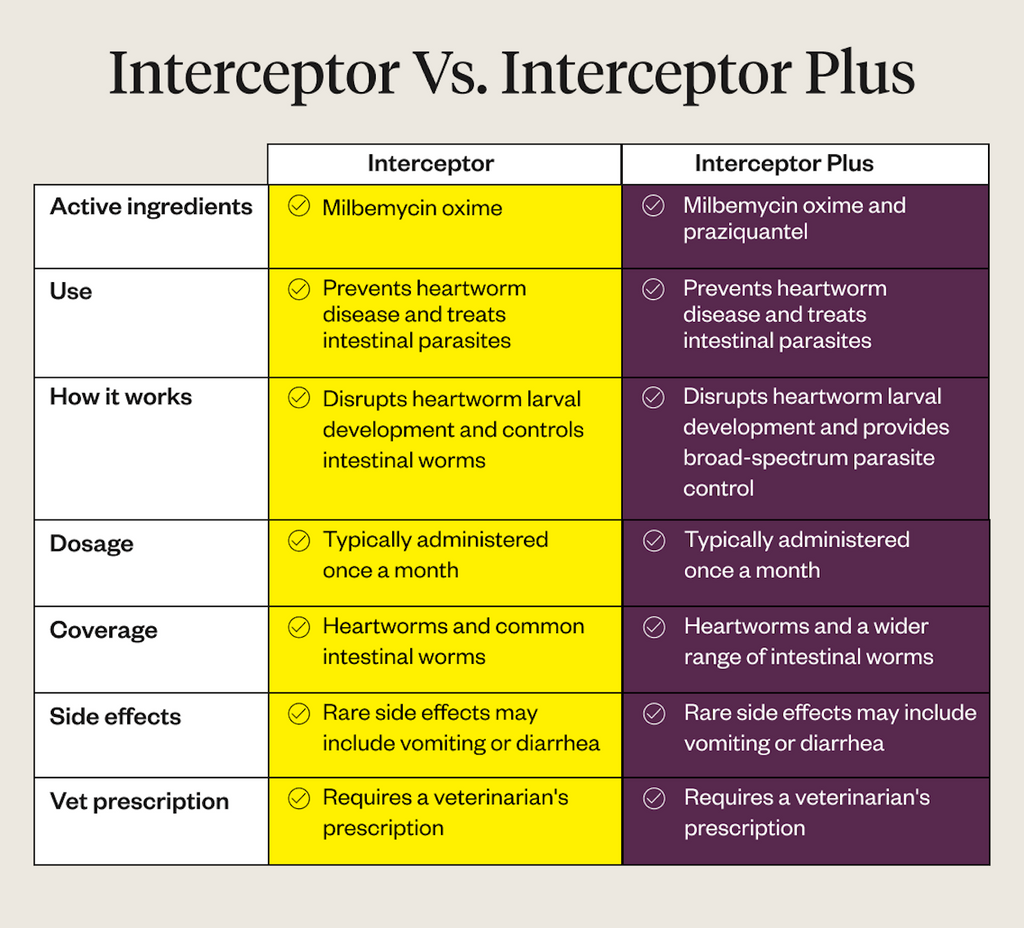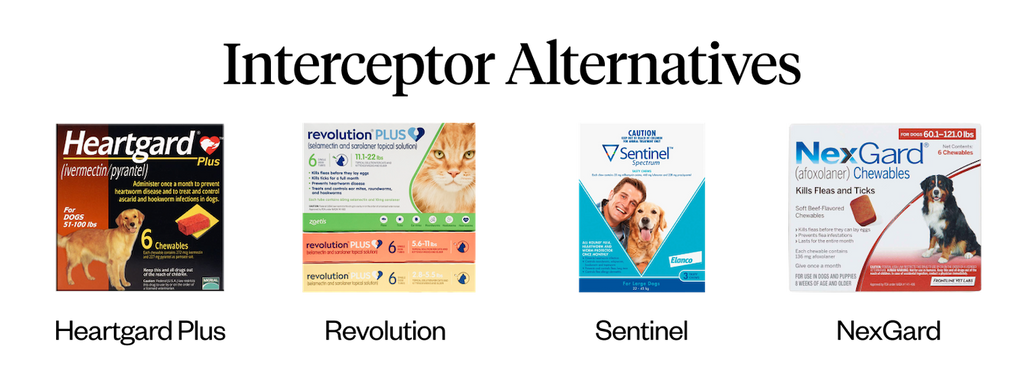8 Min Read
Interceptor Vs. Interceptor Plus
Key takeaway
Parasites can be detrimental to your pet’s health if not taken seriously. Rather than contracting a parasite, preventing it from happening in the first place is a much better option. Interceptor and Interceptor Plus are two prescription preventative medications for pets that keep heartworms and various intestinal worms at bay.

Why pet owners are switching to online vet care with Dutch
-
Prescriptions delivered free to you
-
Fast access to Licensed Vets over video
-
Unlimited video visits and follow-ups
With numerous parasitic preventives available, selecting the right one for your pet can be a challenge. Among these options, Interceptor and Interceptor Plus are notable. Interceptor protects both cats and dogs from heartworms, adult roundworms, adult hookworms, and adult whipworms. On the other hand, in addition to these parasites, Interceptor Plus offers added protection to dogs against adult tapeworms.
In this blog post, we'll discuss their similarities and differences, including side effects, dosage, and more. Join us to determine the most suitable choice for your pet.
- What Is Interceptor?
- What's The Difference Between Interceptor And Interceptor Plus?
- The Importance Of Heartworm Prevention In Pets
- Protecting Your Pet Against Intestinal Worms
- Interceptor Alternatives
- FAQs
- Final Notes
What Is Interceptor?
Interceptor is a broad-spectrum parasitic preventive suitable for both cats and dogs. It's primarily formulated to guard against heartworms and certain intestinal parasites, including adult roundworms, adult hookworms, and adult whipworms. Recognized for its efficacy, it stands as a trusted medication in pet healthcare and can be administered year-round for consistent protection.1
Active Ingredient & Mechanism Of Action
Interceptor's active ingredient, milbemycin oxime, is a broad-spectrum parasiticide that targets the nervous system of parasites. It operates by attaching to specific sites known as glutamate-gated chloride channels, which are vital for the regular functioning of the nervous system. When a parasite encounters milbemycin oxime, this substance binds to these channels, causing paralysis and subsequently leading to the parasite's death. Notably, milbemycin oxime is adept at combatting heartworm larvae and certain intestinal parasites.1
Format
Interceptor is available as a tablet, crafted with a beef flavor pets tend to favor. It should be administered monthly, preferably on the same date each month.1
Uses
Interceptor offers protection against the following parasites in pets:
- Heartworms: Heartworms are transmitted to pets through mosquito bites. Once matured, they live in the heart and large blood vessels, leading to severe cardiac and respiratory issues.
- Roundworms: Roundworms are one of the most common intestinal parasites in pets. They can cause symptoms like vomiting, diarrhea, weight loss, and a pot-bellied appearance.
- Hookworms: Hookworms attach to the lining of a pet’s intestinal wall and feed on their blood, potentially leading to anemia. Symptoms might include diarrhea, weight loss, and weakness.
- Whipworms: Whipworms inhabit the large intestine and can cause inflammation. Symptoms often include diarrhea, dehydration, and weight loss.
Side Effects
The side effects associated with Interceptor include:
- Vomiting
- Anorexia
- Ataxia
- Convulsions
- Diarrhea
- Weakness
- Hypersalivation
- Depression
- Lethargy1
If you see your pet exhibiting any of these behaviors or actions after a dose of Interceptor, call your vet immediately.
Dosage
For pets, the dosage of Interceptor is primarily determined by their body weight. It's essential to ensure the correct dosage to achieve maximum efficacy while avoiding potential side effects.
Please refer to the following chart from the manufacturer for dogs:
- 2-10 lbs = One 2.3 mg tablet
- 11-25 lbs = One 5.75 mg tablet
- 26-50 lbs = One 11.5 mg tablet
- 51-100 lbs = One 23.0 mg tablet1
And the following chart for cats:
- 1.5-6 lbs =One 5.75 mg tablet
- 6.1-12 lbs = One 11.5 mg tablet
- 12.1-25 lbs = One 23.0 mg tablet1
Safety
For safety, Interceptor should not be used in kittens less than six weeks of age or weighing less than 1.5 lbs, nor in puppies younger than four weeks or weighing less than two pounds. Its safety in heartworm-positive cats, as well as in breeding or pregnant pets, hasn't been established. Before starting an Interceptor treatment program, dogs should be tested for existing heartworm infections and, if infected, treated to remove adult heartworms and microfilariae, or the early-stage larvae of heartworms.1
What's The Difference Between Interceptor And Interceptor Plus?

Interceptor and Interceptor Plus are both parasitic preventives for pets. However, Interceptor Plus is only approved for use in dogs. Additionally, Interceptor features the addition of praziquantel, a broad-spectrum anthelmintic used to target tapeworms.2
The Importance Of Heartworm Prevention In Pets
What is heartworm disease in pets?
Heartworm disease in pets is a serious and potentially fatal condition caused by parasitic worms living in the heart and major blood vessels. If left untreated, the disease can cause severe heart failure, lung disease, and damage to other organs.3
How do pets get infected with heartworms?
Pets become infected with heartworms through the bite of an infected mosquito. When a mosquito bites an infected animal, it picks up tiny heartworm larvae called microfilariae. After maturing inside the mosquito for a short period, these larvae become infective. The next time the mosquito bites another animal, it transmits the matured larvae into the bloodstream, beginning the cycle of infection in the new host.3
What are the symptoms of heartworm disease?

The symptoms of heartworm disease in your pet vary based on the duration of infection, the number of worms, and your pet's individual response to them. The activity level of your pet also influences the severity and onset of symptoms. A less active pet or one with fewer worms might display symptoms more slowly. Conversely, an active pet will typically exhibit symptoms more quickly.4
There are four classes of heartworm disease with each stage indicating the severity of the disease. Each class denotes a particular severity and symptoms. They include:
- Class 1: No symptoms or a mild symptom in the form of an occasional cough.
- Class 2: Mild symptoms that can include an occasional cough and deeper tiredness after activity.
- Class 3: Symptoms are more obvious and include a poor or sickly appearance, cough that doesn't resolve, and tiredness after moderate activity. Breathing difficulty is obvious and the changes will show up on an x-ray.
- Class 4: There are so many worms that the pet is considered to be suffering from caval syndrome. The blood flow to the heart is blocked by the worms, and the only treatment option is surgery.
Can heartworm disease be treated?
Success varies based on the severity of the infestation class. Pets within stable classes 1, 2, or 3 can be treated with melarsomine dihydrochloride, a medication containing arsenic that effectively eliminates adult heartworms. Administered through deep injections into the pet’s back muscles, this treatment is potent but highly toxic.4
Protecting Your Pet Against Intestinal Worms
Various types of worms can find a home in your pet's intestines, resulting in health issues. Hookworms, roundworms, whipworms, and tapeworms are among those that might take up residence in your pet's digestive system, often acquired during outdoor activities or interactions with rodents. Taking steps to prevent worm infestations not only safeguards your pet but also shields you and your family from potential health concerns.
Unlike heartworms, intestinal worms live within your pet's digestive system, causing symptoms like vomiting, diarrhea, weight loss, lethargy, and abdominal discomfort. Severe infestations can lead to anemia, persistent health problems, and even death, posing a particular threat to young or immunocompromised pets. These worms can also be transmitted to humans, especially children and individuals with weakened immune systems, through contact with pet waste. By practicing good hygiene, promptly cleaning up after pets, and considering a commercially prepared diet, you can decrease the risk of worm transmission.
Interceptor Alternatives

In the event your pet isn't a candidate for Interceptor or Interceptor Plus, there are other prescription dewormers available that are capable of preventing heartworms. They include:
Heartgard Plus
Heartgard Plus is a monthly oral medication designed to prevent heartworm disease in dogs by targeting and eliminating heartworm larvae and certain intestinal parasites.
Revolution
Revolution is a topical medication that provides comprehensive protection for dogs and cats by preventing heartworm disease, controlling flea infestations, treating ear mites, and managing certain types of ticks.
Sentinel
Sentinel is a monthly oral preventive medication for dogs that offers protection against heartworms, controls flea populations, and disrupts the development of certain intestinal parasites.
NexGard Spectra
NexGard Spectra is a chewable monthly medication for dogs that provides a broad-spectrum defense by preventing flea and tick infestations, while also safeguarding against heartworm disease and controlling intestinal worms.
FAQs
Do I need a prescription to buy Interceptor or Interceptor Plus?
Yes, you need a prescription to buy either product. Your vet can supply you with the appropriate prescription for your pet.
Can indoor dogs get heartworm disease?
Yes, indoor dogs can get heartworm disease as mosquitoes can find their way inside a home. A mosquito that's carrying heartworm larvae can bite your dog inside your home the same as it can when outdoors.
Is heartworm prevention necessary year-round?
Yes, heartworm prevention is recommended year-round to ensure continuous protection against potential exposure to infected mosquitoes and to maintain your pet's health.

Final Notes
Heartworm disease is a serious issue for pets, and prevention is key to keeping your pet from becoming an unwitting host. Detecting signs of a heartworm infestation can be tough, making preventive measures all the more important. Talk to your vet about the benefits of Interceptor Plus vs Interceptor to learn more about which medication is appropriate for your pet.
Experience the convenience of online vet care with Dutch. Whether you want to discuss heartworm prevention or any ongoing pet health issues, Dutch is here to help. Get prescriptions from our online pharmacy delivered free to your door and enjoy unlimited calls and follow-ups with a Dutch membership. Try Dutch today.Share
References
-
Interceptor Flavor Tabs, National Institutes of Health, https://dailymed.nlm.nih.gov/dailymed/fda/fdaDrugXsl.cfm?setid=77a42e00-d311-4cae-9130-b75bb4b40864&type=display
-
Praziquantel (Oral Route), Mayo Clinic, https://www.mayoclinic.org/drugs-supplements/praziquantel-oral-route/side-effects/drg-20065610?p=1
-
Heartworm Basics, American Heartworm Society, https://www.heartwormsociety.org/pet-owner-resources/heartworm-basics
-
Atkins, Clarke E., DACVIM, Heartworm Disease in Dogs, Merck Veterinary Manual, revised 6/2018, modified 10/2022, https://www.merckvetmanual.com/dog-owners/heart-and-blood-vessel-disorders-of-dogs/heartworm-disease-in-dogs



